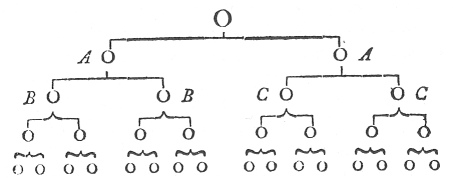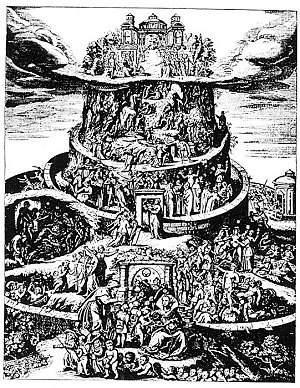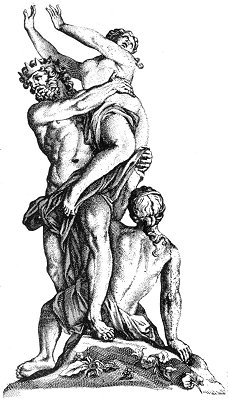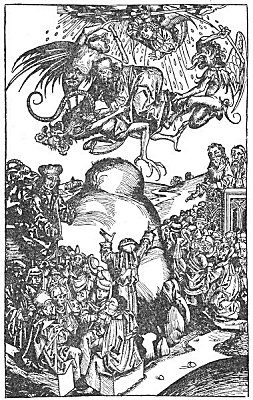Subtle as is the artifice in this description of human nature, and in that affectation of beholding on the one side nothing but tyrants and despots, and on the other only oppressed and trembling slaves in the state of society; whatever share Nature may have had in the institution of social order, or in reclaiming mankind from forests and wildernesses to live under laws and a common chief; the Hierophant nevertheless exultingly exclaims, “Such is the faithful and philosophic picture of despotism and of liberty, of our wishes and of our fears. Despotism was engrafted on liberty, and from despotism shall liberty once more spring. The re-union of men in society is at once the cradle and the grave of despotism; it is also the grave and cradle of liberty. We were once possessed of liberty, and we lost it but to find it again and never lose it more; to learn by the very privation of it the art of better enjoying it in future.” Reader, observe these words; if they do not evidently point out the object of the Sect, if you do not perceive the wish of bringing mankind back to those times of the nomade herds of savages, and of men destitute of property, laws, or government, read and convince yourself by what follows: “Nature drew men from the savage state and re-united them in civil societies; from these societies we proceed to further wishes, and to a wiser choice (aus den staaten tretten wir in neue klüger gewählte). New associations present themselves to these wishes, and by their means we return to the state whence we came, not again to run the former course, but better to enjoy our new destiny—let us explain this mystery.”
“Men then had passed from their peaceable state to the yoke of servitude; Eden, that terrestrial paradise, was lost to them. Subjects of sin and slavery, they were reduced to servitude and obliged to gain their bread by the sweat of their brow.—In the number of these men some promised to protect, and thus became their
p. 478
chiefs—at first they reigned over herds or clans—these were soon conquered, or united together in order to form a numerous people; hence arose nations and their chiefs kings of nations. At the formation of states and nations, the world ceased to be a great family, to be a single empire; the great bond of nature was rent asunder.”
The impudence of such assertions must astonish the reader; he will ask himself can there possibly exist beings thus belying evidence itself, and pretending to show the universe forming but one and the same family, and the grand bond of nature in those roaming and scattered herds, where the child can scarcely walk when he is separated from his father? How is it possible to represent mankind as divorcing from the great family, at the very period when they unite under the same chiefs and the same laws, for their mutual protection and safety? But, reader, suspend thy indignation. Let us call up in evidence against the Sect those brigands and sophisticated murderers which it decorated with the high-sounding title of Patriots, and which it stimulated to bloodshed and methodized murder by the fanaticizing sounds of people, nation, country. At the very time that they rend the air with such accents, with names so dear as they pretend, hear the maledictions which their mysteries heap upon every people, every nation, every country.
At that period, when men re-united and formed nations, “they ceased to acknowledge a common name—Nationalism, or the love for a particular nation, took place of the general love. With the division of the globe, and of its states, benevolence was restrained within certain limits, beyond which it could no longer trespass.—Then it became a merit to extend the bounds of states at the expence of the neighbouring ones. Then it became lawful to abuse, offend, and despise foreigners, to attain that end—and this virtue was styled patriotism; and he was styled a patriot who, just toward his countrymen, and unjust to others, was blind to the merits of strangers, and believed the very vices of his own country to be perfections.—In such a case, why not restrain that love within a narrower compass, to citizens living in the same town, or to the members of one family; or why even should not each person have concentrated his affections in himself. We really beheld Patriotism generating Localism, the confined spirit of families, and at length Egoism. Hence the origin of states and governments, and of civil society, has really proved to be the seeds of discord, and Patriotism has found its punishment in itself . . .Diminish, reject that love of the country, and mankind will once more learn to know and love each other as men. Partiality being cast aside, that union of hearts will once more appear and expand itself—on the contrary, extend the bonds of Patriotism, and you will teach man that it is impossible to blame the closer contraction of love, to a single family, to a single person, in a word, to the strictest Egoism.”

Moe is the founder of GnosticWarrior.com. He is a father, husband, author, martial arts black belt, and an expert in Gnosticism, the occult, and esotericism.





